Transtheoretical Model of Change and Motivational Interviewing for Patient Care
VerifiedAdded on 2023/06/03
|8
|2202
|413
AI Summary
The paper discusses the implementation of Transtheoretical Model of Change and Motivational Interviewing methods for maintaining patients through the stages of progress cycle. It highlights the evidence-based interventions and strategies for successful behavior change.
Contribute Materials
Your contribution can guide someone’s learning journey. Share your
documents today.
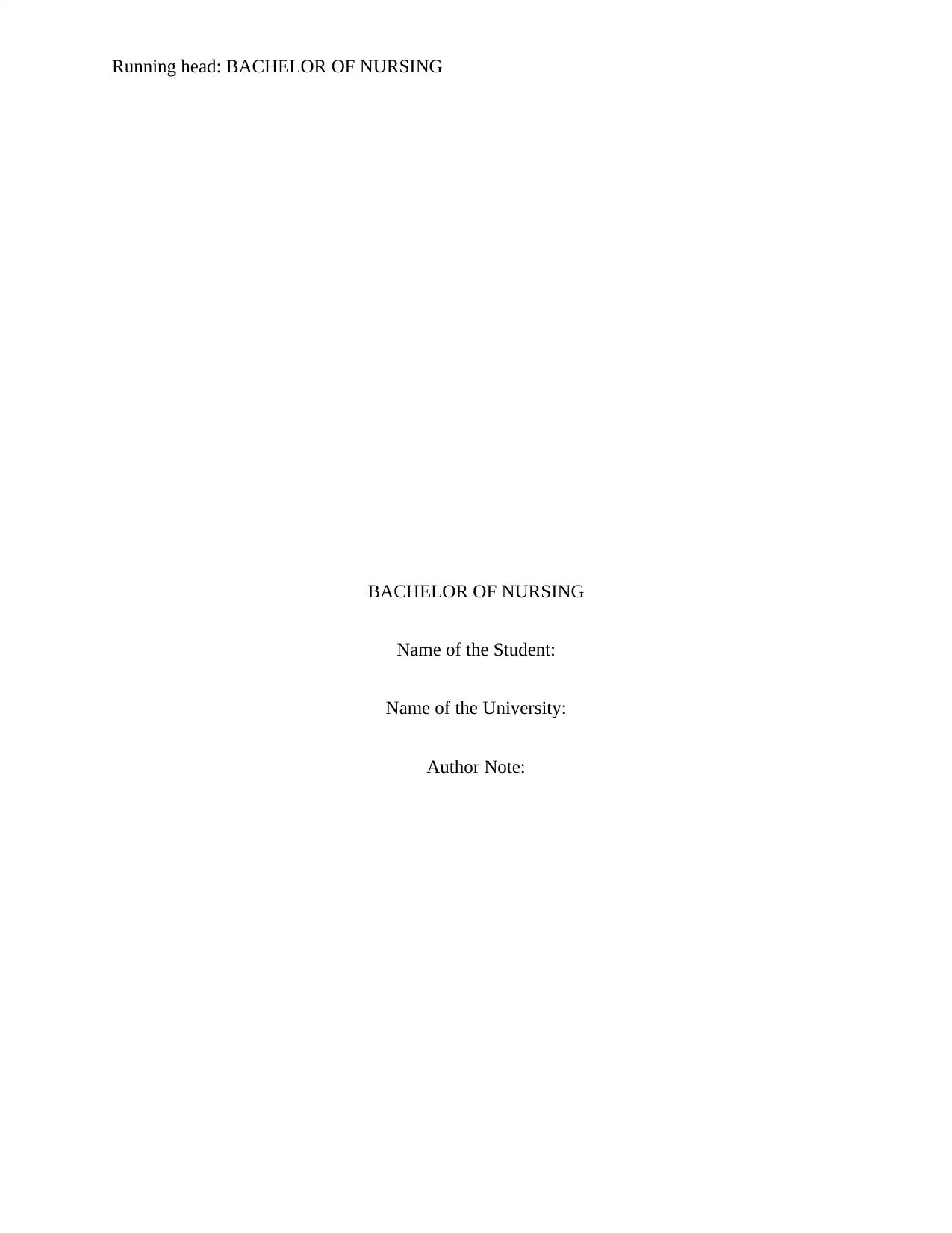
Running head: BACHELOR OF NURSING
BACHELOR OF NURSING
Name of the Student:
Name of the University:
Author Note:
BACHELOR OF NURSING
Name of the Student:
Name of the University:
Author Note:
Secure Best Marks with AI Grader
Need help grading? Try our AI Grader for instant feedback on your assignments.
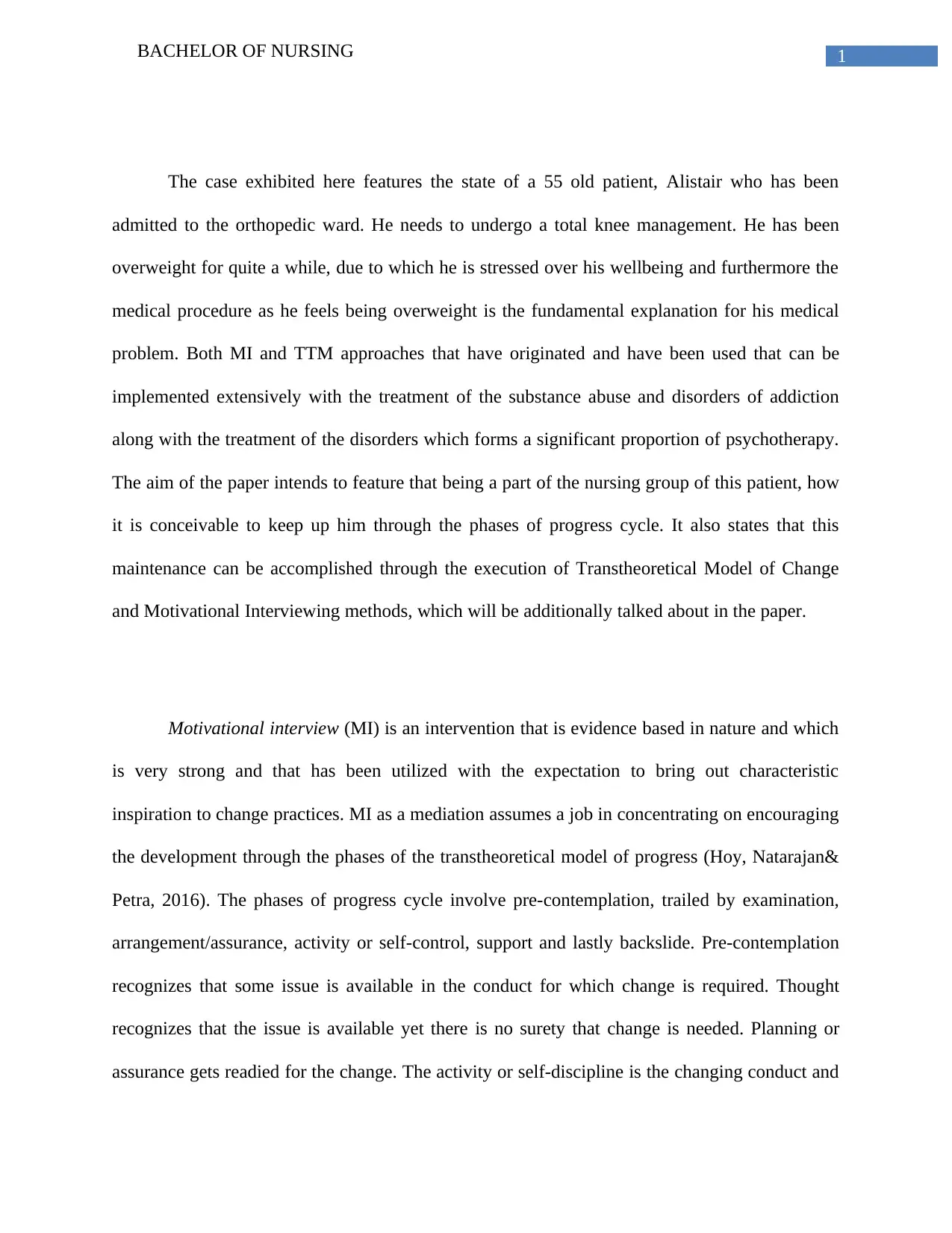
1BACHELOR OF NURSING
The case exhibited here features the state of a 55 old patient, Alistair who has been
admitted to the orthopedic ward. He needs to undergo a total knee management. He has been
overweight for quite a while, due to which he is stressed over his wellbeing and furthermore the
medical procedure as he feels being overweight is the fundamental explanation for his medical
problem. Both MI and TTM approaches that have originated and have been used that can be
implemented extensively with the treatment of the substance abuse and disorders of addiction
along with the treatment of the disorders which forms a significant proportion of psychotherapy.
The aim of the paper intends to feature that being a part of the nursing group of this patient, how
it is conceivable to keep up him through the phases of progress cycle. It also states that this
maintenance can be accomplished through the execution of Transtheoretical Model of Change
and Motivational Interviewing methods, which will be additionally talked about in the paper.
Motivational interview (MI) is an intervention that is evidence based in nature and which
is very strong and that has been utilized with the expectation to bring out characteristic
inspiration to change practices. MI as a mediation assumes a job in concentrating on encouraging
the development through the phases of the transtheoretical model of progress (Hoy, Natarajan&
Petra, 2016). The phases of progress cycle involve pre-contemplation, trailed by examination,
arrangement/assurance, activity or self-control, support and lastly backslide. Pre-contemplation
recognizes that some issue is available in the conduct for which change is required. Thought
recognizes that the issue is available yet there is no surety that change is needed. Planning or
assurance gets readied for the change. The activity or self-discipline is the changing conduct and
The case exhibited here features the state of a 55 old patient, Alistair who has been
admitted to the orthopedic ward. He needs to undergo a total knee management. He has been
overweight for quite a while, due to which he is stressed over his wellbeing and furthermore the
medical procedure as he feels being overweight is the fundamental explanation for his medical
problem. Both MI and TTM approaches that have originated and have been used that can be
implemented extensively with the treatment of the substance abuse and disorders of addiction
along with the treatment of the disorders which forms a significant proportion of psychotherapy.
The aim of the paper intends to feature that being a part of the nursing group of this patient, how
it is conceivable to keep up him through the phases of progress cycle. It also states that this
maintenance can be accomplished through the execution of Transtheoretical Model of Change
and Motivational Interviewing methods, which will be additionally talked about in the paper.
Motivational interview (MI) is an intervention that is evidence based in nature and which
is very strong and that has been utilized with the expectation to bring out characteristic
inspiration to change practices. MI as a mediation assumes a job in concentrating on encouraging
the development through the phases of the transtheoretical model of progress (Hoy, Natarajan&
Petra, 2016). The phases of progress cycle involve pre-contemplation, trailed by examination,
arrangement/assurance, activity or self-control, support and lastly backslide. Pre-contemplation
recognizes that some issue is available in the conduct for which change is required. Thought
recognizes that the issue is available yet there is no surety that change is needed. Planning or
assurance gets readied for the change. The activity or self-discipline is the changing conduct and
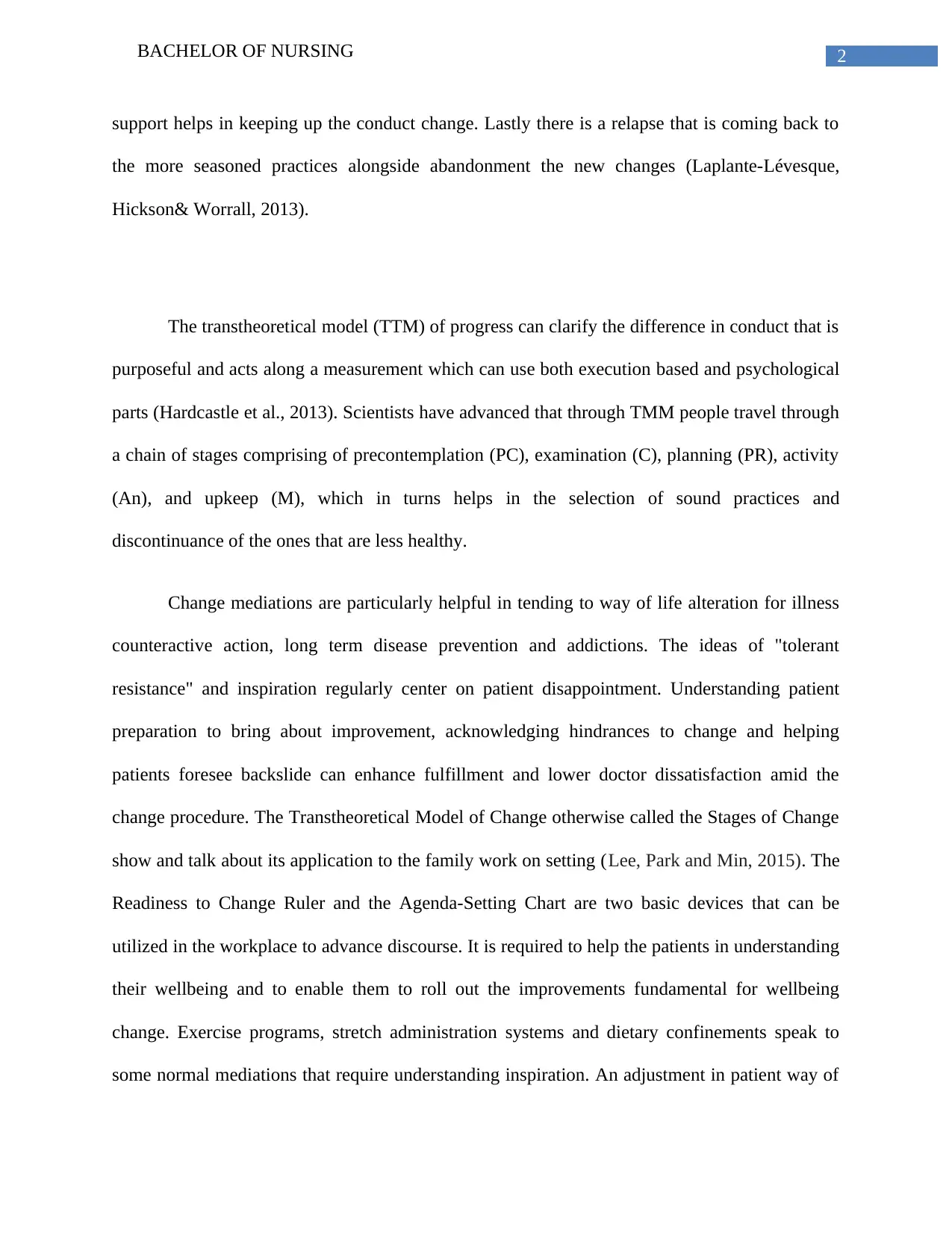
2BACHELOR OF NURSING
support helps in keeping up the conduct change. Lastly there is a relapse that is coming back to
the more seasoned practices alongside abandonment the new changes (Laplante-Lévesque,
Hickson& Worrall, 2013).
The transtheoretical model (TTM) of progress can clarify the difference in conduct that is
purposeful and acts along a measurement which can use both execution based and psychological
parts (Hardcastle et al., 2013). Scientists have advanced that through TMM people travel through
a chain of stages comprising of precontemplation (PC), examination (C), planning (PR), activity
(An), and upkeep (M), which in turns helps in the selection of sound practices and
discontinuance of the ones that are less healthy.
Change mediations are particularly helpful in tending to way of life alteration for illness
counteractive action, long term disease prevention and addictions. The ideas of "tolerant
resistance" and inspiration regularly center on patient disappointment. Understanding patient
preparation to bring about improvement, acknowledging hindrances to change and helping
patients foresee backslide can enhance fulfillment and lower doctor dissatisfaction amid the
change procedure. The Transtheoretical Model of Change otherwise called the Stages of Change
show and talk about its application to the family work on setting (Lee, Park and Min, 2015). The
Readiness to Change Ruler and the Agenda-Setting Chart are two basic devices that can be
utilized in the workplace to advance discourse. It is required to help the patients in understanding
their wellbeing and to enable them to roll out the improvements fundamental for wellbeing
change. Exercise programs, stretch administration systems and dietary confinements speak to
some normal mediations that require understanding inspiration. An adjustment in patient way of
support helps in keeping up the conduct change. Lastly there is a relapse that is coming back to
the more seasoned practices alongside abandonment the new changes (Laplante-Lévesque,
Hickson& Worrall, 2013).
The transtheoretical model (TTM) of progress can clarify the difference in conduct that is
purposeful and acts along a measurement which can use both execution based and psychological
parts (Hardcastle et al., 2013). Scientists have advanced that through TMM people travel through
a chain of stages comprising of precontemplation (PC), examination (C), planning (PR), activity
(An), and upkeep (M), which in turns helps in the selection of sound practices and
discontinuance of the ones that are less healthy.
Change mediations are particularly helpful in tending to way of life alteration for illness
counteractive action, long term disease prevention and addictions. The ideas of "tolerant
resistance" and inspiration regularly center on patient disappointment. Understanding patient
preparation to bring about improvement, acknowledging hindrances to change and helping
patients foresee backslide can enhance fulfillment and lower doctor dissatisfaction amid the
change procedure. The Transtheoretical Model of Change otherwise called the Stages of Change
show and talk about its application to the family work on setting (Lee, Park and Min, 2015). The
Readiness to Change Ruler and the Agenda-Setting Chart are two basic devices that can be
utilized in the workplace to advance discourse. It is required to help the patients in understanding
their wellbeing and to enable them to roll out the improvements fundamental for wellbeing
change. Exercise programs, stretch administration systems and dietary confinements speak to
some normal mediations that require understanding inspiration. An adjustment in patient way of
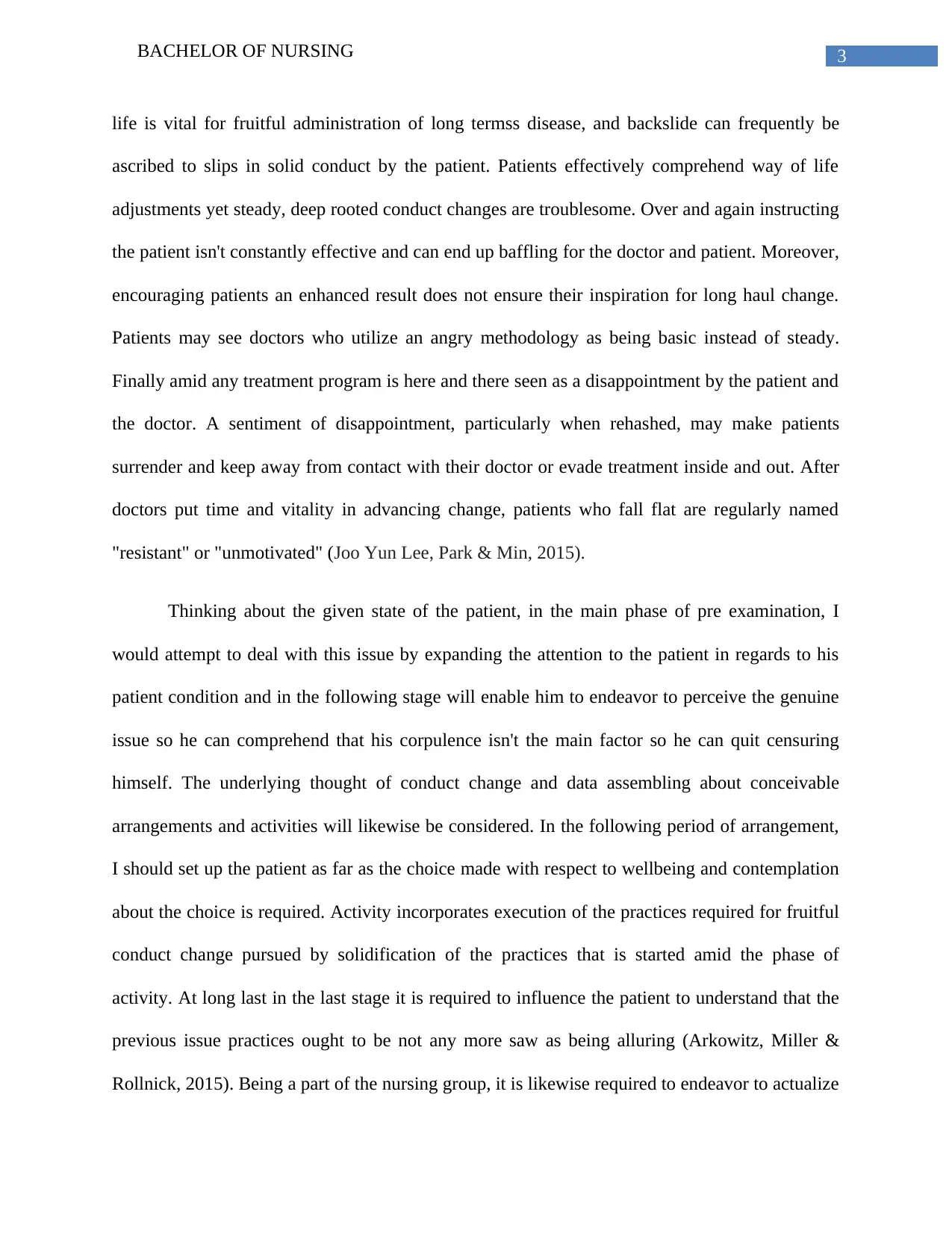
3BACHELOR OF NURSING
life is vital for fruitful administration of long termss disease, and backslide can frequently be
ascribed to slips in solid conduct by the patient. Patients effectively comprehend way of life
adjustments yet steady, deep rooted conduct changes are troublesome. Over and again instructing
the patient isn't constantly effective and can end up baffling for the doctor and patient. Moreover,
encouraging patients an enhanced result does not ensure their inspiration for long haul change.
Patients may see doctors who utilize an angry methodology as being basic instead of steady.
Finally amid any treatment program is here and there seen as a disappointment by the patient and
the doctor. A sentiment of disappointment, particularly when rehashed, may make patients
surrender and keep away from contact with their doctor or evade treatment inside and out. After
doctors put time and vitality in advancing change, patients who fall flat are regularly named
"resistant" or "unmotivated" (Joo Yun Lee, Park & Min, 2015).
Thinking about the given state of the patient, in the main phase of pre examination, I
would attempt to deal with this issue by expanding the attention to the patient in regards to his
patient condition and in the following stage will enable him to endeavor to perceive the genuine
issue so he can comprehend that his corpulence isn't the main factor so he can quit censuring
himself. The underlying thought of conduct change and data assembling about conceivable
arrangements and activities will likewise be considered. In the following period of arrangement,
I should set up the patient as far as the choice made with respect to wellbeing and contemplation
about the choice is required. Activity incorporates execution of the practices required for fruitful
conduct change pursued by solidification of the practices that is started amid the phase of
activity. At long last in the last stage it is required to influence the patient to understand that the
previous issue practices ought to be not any more saw as being alluring (Arkowitz, Miller &
Rollnick, 2015). Being a part of the nursing group, it is likewise required to endeavor to actualize
life is vital for fruitful administration of long termss disease, and backslide can frequently be
ascribed to slips in solid conduct by the patient. Patients effectively comprehend way of life
adjustments yet steady, deep rooted conduct changes are troublesome. Over and again instructing
the patient isn't constantly effective and can end up baffling for the doctor and patient. Moreover,
encouraging patients an enhanced result does not ensure their inspiration for long haul change.
Patients may see doctors who utilize an angry methodology as being basic instead of steady.
Finally amid any treatment program is here and there seen as a disappointment by the patient and
the doctor. A sentiment of disappointment, particularly when rehashed, may make patients
surrender and keep away from contact with their doctor or evade treatment inside and out. After
doctors put time and vitality in advancing change, patients who fall flat are regularly named
"resistant" or "unmotivated" (Joo Yun Lee, Park & Min, 2015).
Thinking about the given state of the patient, in the main phase of pre examination, I
would attempt to deal with this issue by expanding the attention to the patient in regards to his
patient condition and in the following stage will enable him to endeavor to perceive the genuine
issue so he can comprehend that his corpulence isn't the main factor so he can quit censuring
himself. The underlying thought of conduct change and data assembling about conceivable
arrangements and activities will likewise be considered. In the following period of arrangement,
I should set up the patient as far as the choice made with respect to wellbeing and contemplation
about the choice is required. Activity incorporates execution of the practices required for fruitful
conduct change pursued by solidification of the practices that is started amid the phase of
activity. At long last in the last stage it is required to influence the patient to understand that the
previous issue practices ought to be not any more saw as being alluring (Arkowitz, Miller &
Rollnick, 2015). Being a part of the nursing group, it is likewise required to endeavor to actualize
Secure Best Marks with AI Grader
Need help grading? Try our AI Grader for instant feedback on your assignments.
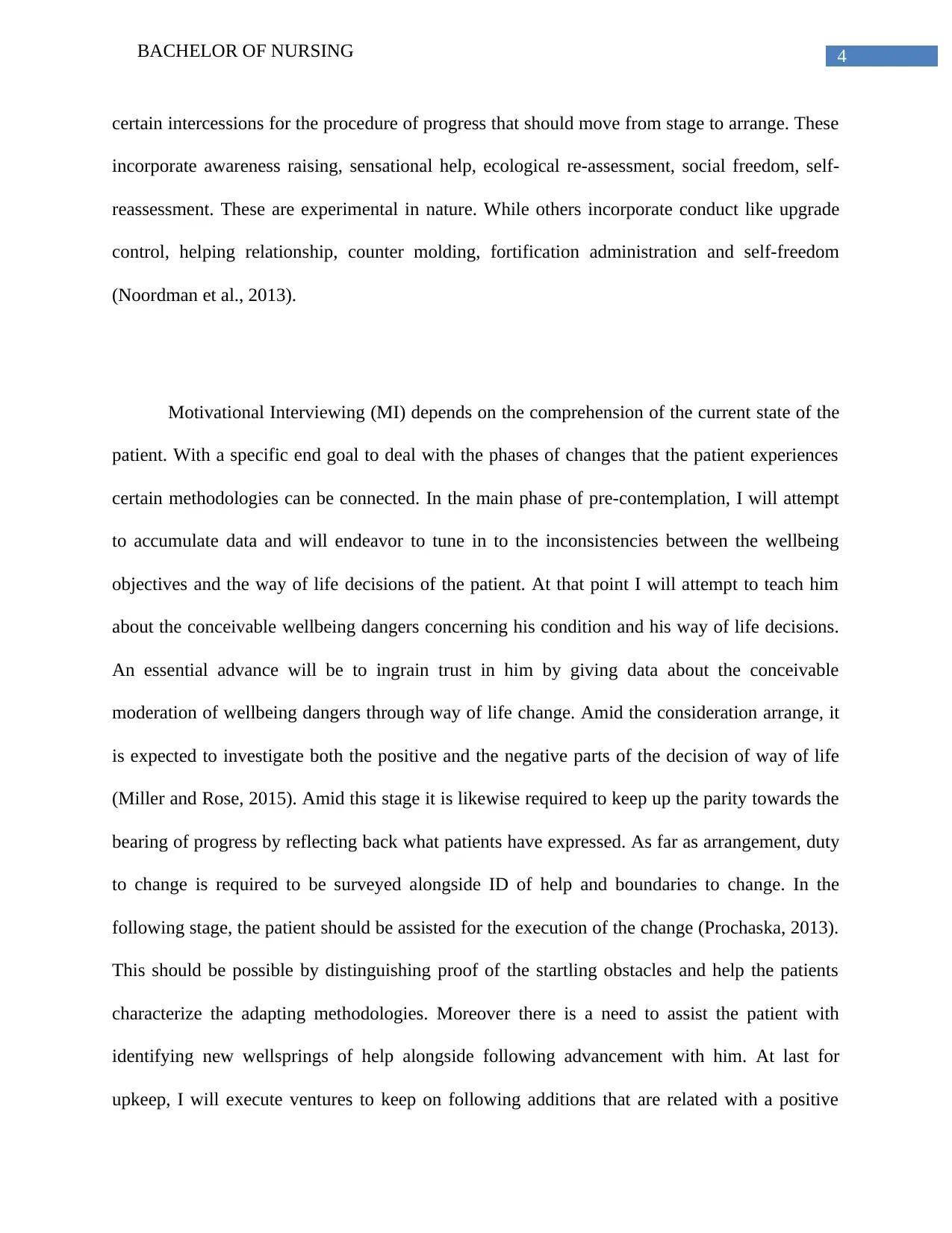
4BACHELOR OF NURSING
certain intercessions for the procedure of progress that should move from stage to arrange. These
incorporate awareness raising, sensational help, ecological re-assessment, social freedom, self-
reassessment. These are experimental in nature. While others incorporate conduct like upgrade
control, helping relationship, counter molding, fortification administration and self-freedom
(Noordman et al., 2013).
Motivational Interviewing (MI) depends on the comprehension of the current state of the
patient. With a specific end goal to deal with the phases of changes that the patient experiences
certain methodologies can be connected. In the main phase of pre-contemplation, I will attempt
to accumulate data and will endeavor to tune in to the inconsistencies between the wellbeing
objectives and the way of life decisions of the patient. At that point I will attempt to teach him
about the conceivable wellbeing dangers concerning his condition and his way of life decisions.
An essential advance will be to ingrain trust in him by giving data about the conceivable
moderation of wellbeing dangers through way of life change. Amid the consideration arrange, it
is expected to investigate both the positive and the negative parts of the decision of way of life
(Miller and Rose, 2015). Amid this stage it is likewise required to keep up the parity towards the
bearing of progress by reflecting back what patients have expressed. As far as arrangement, duty
to change is required to be surveyed alongside ID of help and boundaries to change. In the
following stage, the patient should be assisted for the execution of the change (Prochaska, 2013).
This should be possible by distinguishing proof of the startling obstacles and help the patients
characterize the adapting methodologies. Moreover there is a need to assist the patient with
identifying new wellsprings of help alongside following advancement with him. At last for
upkeep, I will execute ventures to keep on following additions that are related with a positive
certain intercessions for the procedure of progress that should move from stage to arrange. These
incorporate awareness raising, sensational help, ecological re-assessment, social freedom, self-
reassessment. These are experimental in nature. While others incorporate conduct like upgrade
control, helping relationship, counter molding, fortification administration and self-freedom
(Noordman et al., 2013).
Motivational Interviewing (MI) depends on the comprehension of the current state of the
patient. With a specific end goal to deal with the phases of changes that the patient experiences
certain methodologies can be connected. In the main phase of pre-contemplation, I will attempt
to accumulate data and will endeavor to tune in to the inconsistencies between the wellbeing
objectives and the way of life decisions of the patient. At that point I will attempt to teach him
about the conceivable wellbeing dangers concerning his condition and his way of life decisions.
An essential advance will be to ingrain trust in him by giving data about the conceivable
moderation of wellbeing dangers through way of life change. Amid the consideration arrange, it
is expected to investigate both the positive and the negative parts of the decision of way of life
(Miller and Rose, 2015). Amid this stage it is likewise required to keep up the parity towards the
bearing of progress by reflecting back what patients have expressed. As far as arrangement, duty
to change is required to be surveyed alongside ID of help and boundaries to change. In the
following stage, the patient should be assisted for the execution of the change (Prochaska, 2013).
This should be possible by distinguishing proof of the startling obstacles and help the patients
characterize the adapting methodologies. Moreover there is a need to assist the patient with
identifying new wellsprings of help alongside following advancement with him. At last for
upkeep, I will execute ventures to keep on following additions that are related with a positive
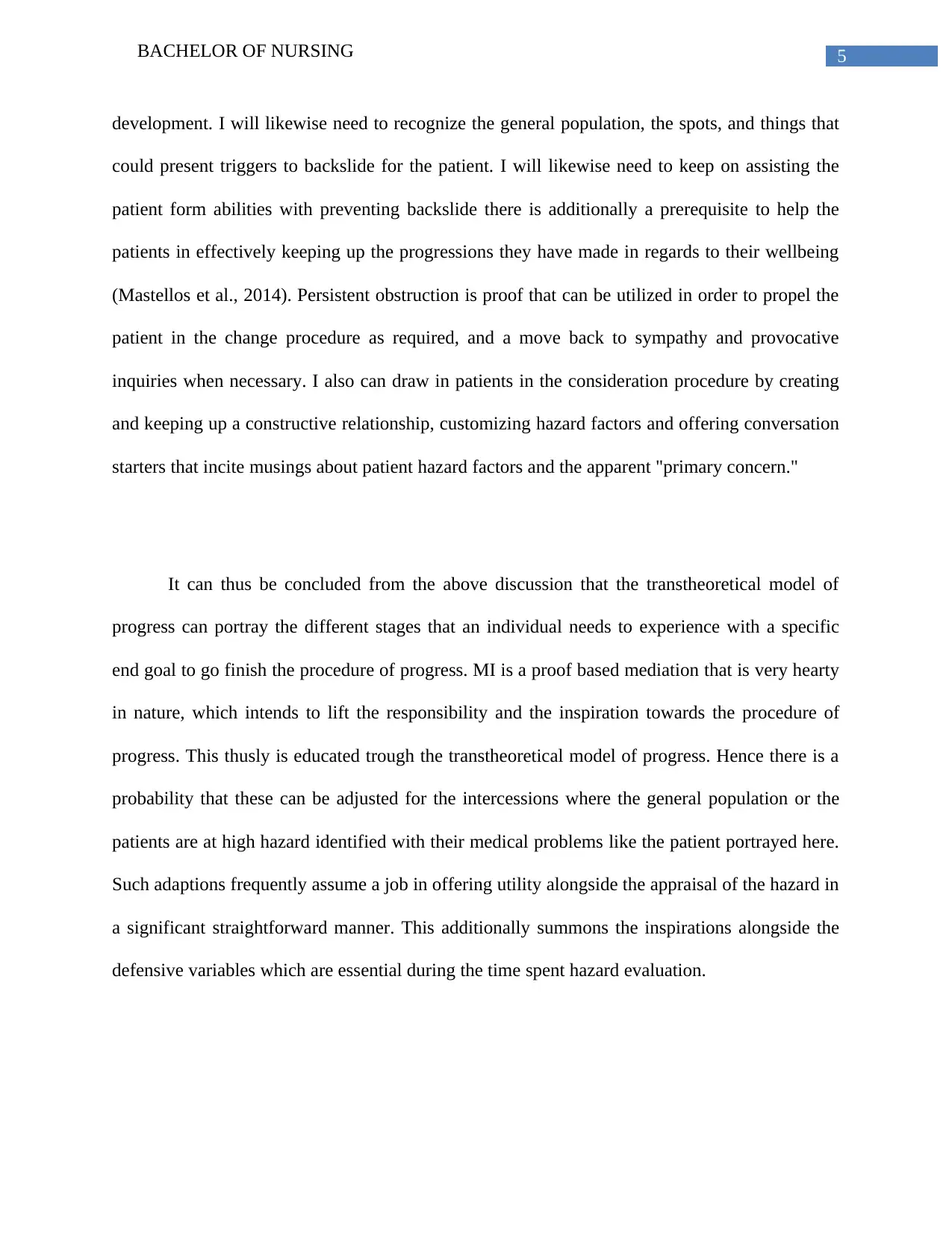
5BACHELOR OF NURSING
development. I will likewise need to recognize the general population, the spots, and things that
could present triggers to backslide for the patient. I will likewise need to keep on assisting the
patient form abilities with preventing backslide there is additionally a prerequisite to help the
patients in effectively keeping up the progressions they have made in regards to their wellbeing
(Mastellos et al., 2014). Persistent obstruction is proof that can be utilized in order to propel the
patient in the change procedure as required, and a move back to sympathy and provocative
inquiries when necessary. I also can draw in patients in the consideration procedure by creating
and keeping up a constructive relationship, customizing hazard factors and offering conversation
starters that incite musings about patient hazard factors and the apparent "primary concern."
It can thus be concluded from the above discussion that the transtheoretical model of
progress can portray the different stages that an individual needs to experience with a specific
end goal to go finish the procedure of progress. MI is a proof based mediation that is very hearty
in nature, which intends to lift the responsibility and the inspiration towards the procedure of
progress. This thusly is educated trough the transtheoretical model of progress. Hence there is a
probability that these can be adjusted for the intercessions where the general population or the
patients are at high hazard identified with their medical problems like the patient portrayed here.
Such adaptions frequently assume a job in offering utility alongside the appraisal of the hazard in
a significant straightforward manner. This additionally summons the inspirations alongside the
defensive variables which are essential during the time spent hazard evaluation.
development. I will likewise need to recognize the general population, the spots, and things that
could present triggers to backslide for the patient. I will likewise need to keep on assisting the
patient form abilities with preventing backslide there is additionally a prerequisite to help the
patients in effectively keeping up the progressions they have made in regards to their wellbeing
(Mastellos et al., 2014). Persistent obstruction is proof that can be utilized in order to propel the
patient in the change procedure as required, and a move back to sympathy and provocative
inquiries when necessary. I also can draw in patients in the consideration procedure by creating
and keeping up a constructive relationship, customizing hazard factors and offering conversation
starters that incite musings about patient hazard factors and the apparent "primary concern."
It can thus be concluded from the above discussion that the transtheoretical model of
progress can portray the different stages that an individual needs to experience with a specific
end goal to go finish the procedure of progress. MI is a proof based mediation that is very hearty
in nature, which intends to lift the responsibility and the inspiration towards the procedure of
progress. This thusly is educated trough the transtheoretical model of progress. Hence there is a
probability that these can be adjusted for the intercessions where the general population or the
patients are at high hazard identified with their medical problems like the patient portrayed here.
Such adaptions frequently assume a job in offering utility alongside the appraisal of the hazard in
a significant straightforward manner. This additionally summons the inspirations alongside the
defensive variables which are essential during the time spent hazard evaluation.
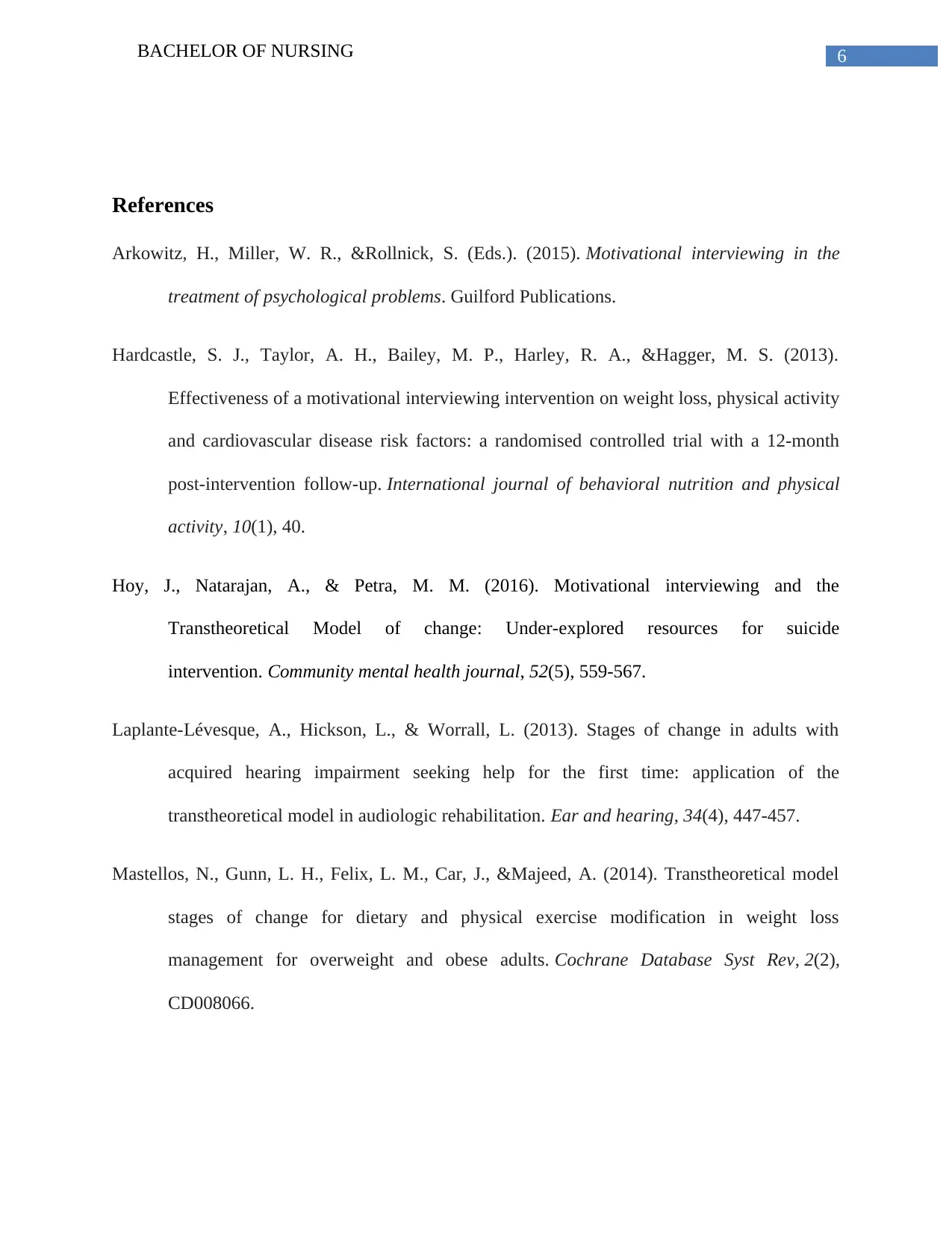
6BACHELOR OF NURSING
References
Arkowitz, H., Miller, W. R., &Rollnick, S. (Eds.). (2015). Motivational interviewing in the
treatment of psychological problems. Guilford Publications.
Hardcastle, S. J., Taylor, A. H., Bailey, M. P., Harley, R. A., &Hagger, M. S. (2013).
Effectiveness of a motivational interviewing intervention on weight loss, physical activity
and cardiovascular disease risk factors: a randomised controlled trial with a 12-month
post-intervention follow-up. International journal of behavioral nutrition and physical
activity, 10(1), 40.
Hoy, J., Natarajan, A., & Petra, M. M. (2016). Motivational interviewing and the
Transtheoretical Model of change: Under-explored resources for suicide
intervention. Community mental health journal, 52(5), 559-567.
Laplante-Lévesque, A., Hickson, L., & Worrall, L. (2013). Stages of change in adults with
acquired hearing impairment seeking help for the first time: application of the
transtheoretical model in audiologic rehabilitation. Ear and hearing, 34(4), 447-457.
Mastellos, N., Gunn, L. H., Felix, L. M., Car, J., &Majeed, A. (2014). Transtheoretical model
stages of change for dietary and physical exercise modification in weight loss
management for overweight and obese adults. Cochrane Database Syst Rev, 2(2),
CD008066.
References
Arkowitz, H., Miller, W. R., &Rollnick, S. (Eds.). (2015). Motivational interviewing in the
treatment of psychological problems. Guilford Publications.
Hardcastle, S. J., Taylor, A. H., Bailey, M. P., Harley, R. A., &Hagger, M. S. (2013).
Effectiveness of a motivational interviewing intervention on weight loss, physical activity
and cardiovascular disease risk factors: a randomised controlled trial with a 12-month
post-intervention follow-up. International journal of behavioral nutrition and physical
activity, 10(1), 40.
Hoy, J., Natarajan, A., & Petra, M. M. (2016). Motivational interviewing and the
Transtheoretical Model of change: Under-explored resources for suicide
intervention. Community mental health journal, 52(5), 559-567.
Laplante-Lévesque, A., Hickson, L., & Worrall, L. (2013). Stages of change in adults with
acquired hearing impairment seeking help for the first time: application of the
transtheoretical model in audiologic rehabilitation. Ear and hearing, 34(4), 447-457.
Mastellos, N., Gunn, L. H., Felix, L. M., Car, J., &Majeed, A. (2014). Transtheoretical model
stages of change for dietary and physical exercise modification in weight loss
management for overweight and obese adults. Cochrane Database Syst Rev, 2(2),
CD008066.
Paraphrase This Document
Need a fresh take? Get an instant paraphrase of this document with our AI Paraphraser
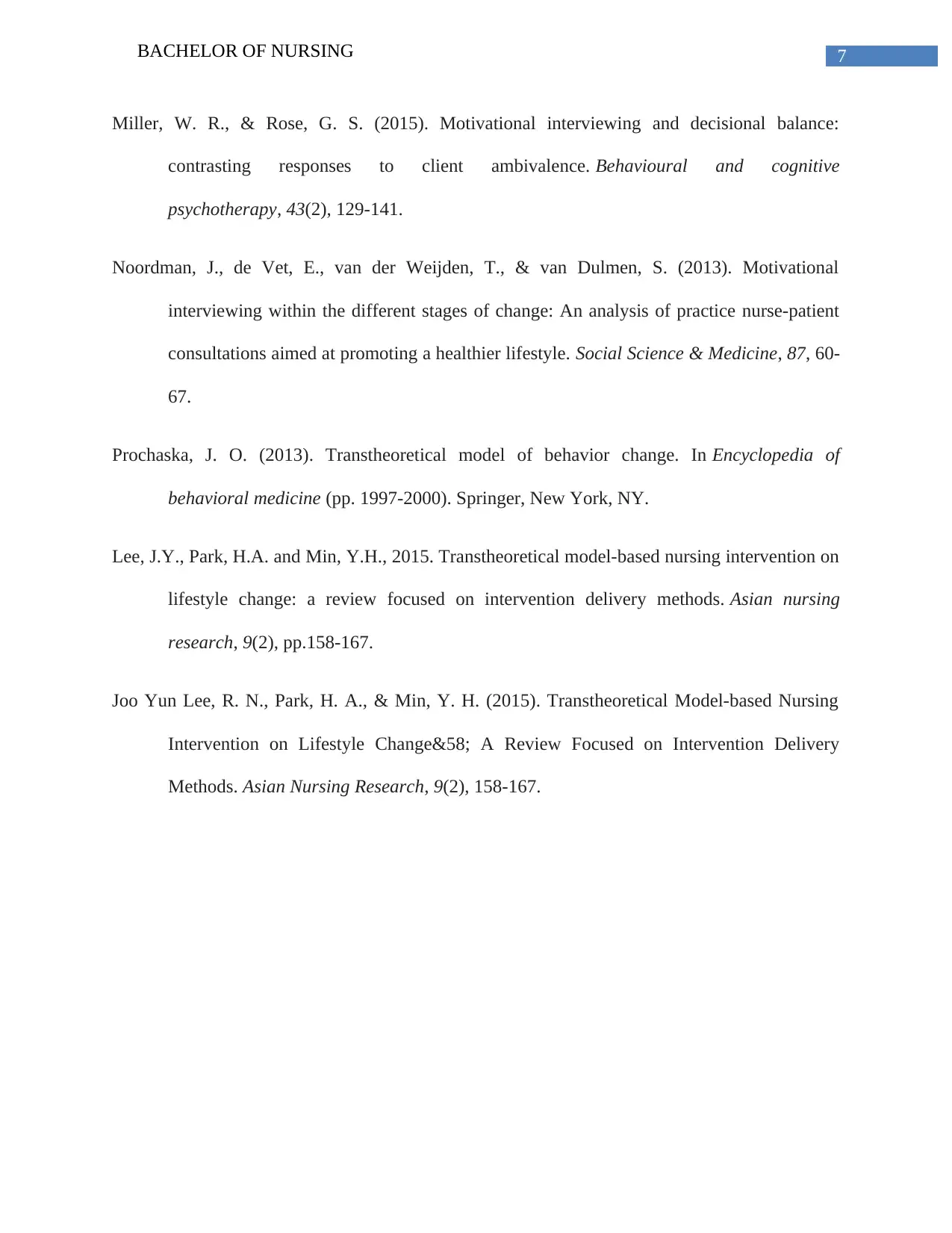
7BACHELOR OF NURSING
Miller, W. R., & Rose, G. S. (2015). Motivational interviewing and decisional balance:
contrasting responses to client ambivalence. Behavioural and cognitive
psychotherapy, 43(2), 129-141.
Noordman, J., de Vet, E., van der Weijden, T., & van Dulmen, S. (2013). Motivational
interviewing within the different stages of change: An analysis of practice nurse-patient
consultations aimed at promoting a healthier lifestyle. Social Science & Medicine, 87, 60-
67.
Prochaska, J. O. (2013). Transtheoretical model of behavior change. In Encyclopedia of
behavioral medicine (pp. 1997-2000). Springer, New York, NY.
Lee, J.Y., Park, H.A. and Min, Y.H., 2015. Transtheoretical model-based nursing intervention on
lifestyle change: a review focused on intervention delivery methods. Asian nursing
research, 9(2), pp.158-167.
Joo Yun Lee, R. N., Park, H. A., & Min, Y. H. (2015). Transtheoretical Model-based Nursing
Intervention on Lifestyle Change&58; A Review Focused on Intervention Delivery
Methods. Asian Nursing Research, 9(2), 158-167.
Miller, W. R., & Rose, G. S. (2015). Motivational interviewing and decisional balance:
contrasting responses to client ambivalence. Behavioural and cognitive
psychotherapy, 43(2), 129-141.
Noordman, J., de Vet, E., van der Weijden, T., & van Dulmen, S. (2013). Motivational
interviewing within the different stages of change: An analysis of practice nurse-patient
consultations aimed at promoting a healthier lifestyle. Social Science & Medicine, 87, 60-
67.
Prochaska, J. O. (2013). Transtheoretical model of behavior change. In Encyclopedia of
behavioral medicine (pp. 1997-2000). Springer, New York, NY.
Lee, J.Y., Park, H.A. and Min, Y.H., 2015. Transtheoretical model-based nursing intervention on
lifestyle change: a review focused on intervention delivery methods. Asian nursing
research, 9(2), pp.158-167.
Joo Yun Lee, R. N., Park, H. A., & Min, Y. H. (2015). Transtheoretical Model-based Nursing
Intervention on Lifestyle Change&58; A Review Focused on Intervention Delivery
Methods. Asian Nursing Research, 9(2), 158-167.
1 out of 8
Related Documents
Your All-in-One AI-Powered Toolkit for Academic Success.
+13062052269
info@desklib.com
Available 24*7 on WhatsApp / Email
![[object Object]](/_next/static/media/star-bottom.7253800d.svg)
Unlock your academic potential
© 2024 | Zucol Services PVT LTD | All rights reserved.





